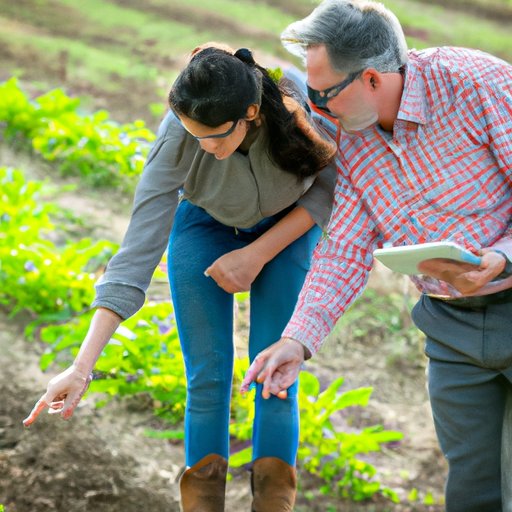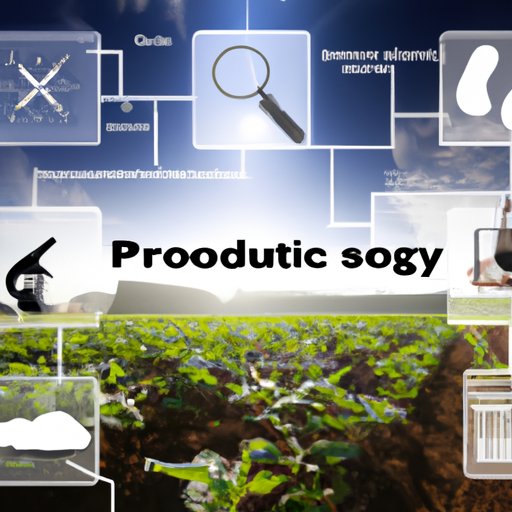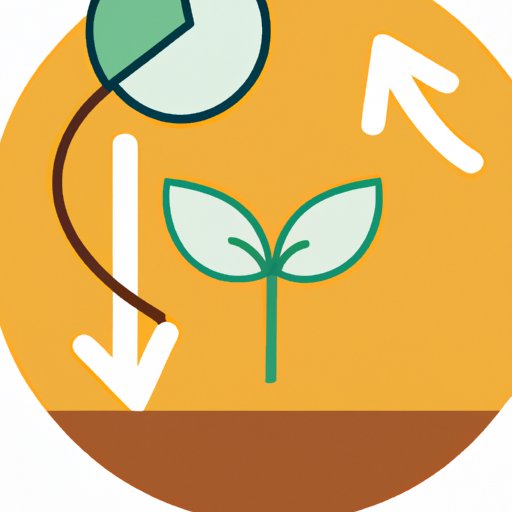Introduction
Agriculture in science is a vast, complex field that encompasses a variety of disciplines and practices. From agronomy to horticulture, there are many areas of study that contribute to the understanding of how to best manage land, crops, and other resources for optimal production. Agriculture has been an integral part of human life since ancient times, and its importance has only increased as technology has advanced. This article will explore the basics of agricultural science, the benefits of sustainable agriculture, and how technology is impacting the future of agriculture.

Exploring the Basics of Agriculture in Science
Agricultural science is the study of the principles and techniques of crop and livestock production, management, and utilization. It includes the study of soil science, plant science, animal science, pest control, irrigation, and other related topics. Agricultural scientists use their knowledge of these topics to develop improved methods of growing crops and raising animals, as well as to improve the quality and quantity of food available to humans.
Agricultural practices involve a range of activities such as planting, harvesting, irrigation, pest control, and soil management. These practices are designed to increase crop yields and improve the quality of the food produced. Agricultural processes involve the processing of raw material into food products that can be consumed by humans. This includes the milling of grains, the processing of dairy products, and the canning of fruits and vegetables.
How Agricultural Science is Evolving
Technology is playing an increasingly important role in modern agriculture. From GPS-guided tractors to robotic harvesters, technology is helping farmers work smarter and more efficiently. Additionally, advances in genetic engineering have enabled scientists to develop new varieties of crops that are more resistant to pests and diseases, as well as more tolerant of drought and other environmental stresses.
Climate change is also having a major impact on agriculture. Rising temperatures, increasing droughts, and other extreme weather events are making it more difficult for farmers to produce enough food to meet global demand. As a result, researchers are working to develop new crop varieties that are better adapted to the changing climate. Additionally, sustainable agricultural practices such as organic farming and permaculture are being embraced as viable alternatives to traditional farming methods.

Investigating the Benefits of Sustainable Agriculture
Sustainable agriculture is an approach to farming that emphasizes the use of renewable resources, conservation of natural resources, and respect for the environment. The goal of sustainable agriculture is to produce food in a way that is economically viable, socially responsible, and environmentally friendly. Sustainable agriculture has numerous benefits, including reduced water and energy consumption, decreased soil erosion, improved soil fertility, and fewer inputs of chemicals and fertilizers.
Examples of sustainable agriculture include agroforestry, which involves integrating trees and shrubs into agricultural systems; integrated pest management, which focuses on controlling pests without relying solely on chemical pesticides; and low-till agriculture, which reduces soil disturbance and increases soil organic matter.

Exploring the Future of Agriculture in Science
The future of agriculture in science is bright. Emerging technologies such as artificial intelligence and robotics will help farmers work more efficiently and increase yields. Additionally, public policies that support sustainable agricultural practices will help ensure that the world’s food supply is secure and nutritious. Finally, the increasing demand for organic and locally grown foods will drive further innovation in agricultural science.
Ultimately, agricultural science is a dynamic field that is constantly evolving. By staying informed about the latest developments in the field, farmers, researchers, and policy makers can ensure that agriculture remains a viable and sustainable source of food for generations to come.
Conclusion
In conclusion, agriculture in science is a complex and ever-evolving field. From the basics of agricultural science to emerging technologies, there is much to explore in this fascinating field. Sustainable agricultural practices can provide a number of benefits, including improved soil fertility, reduced input of chemicals and fertilizers, and increased crop yields. Finally, the future of agriculture in science looks bright, with emerging technologies, public policies, and consumer preferences driving further innovation and sustainability in the field.
(Note: Is this article not meeting your expectations? Do you have knowledge or insights to share? Unlock new opportunities and expand your reach by joining our authors team. Click Registration to join us and share your expertise with our readers.)
